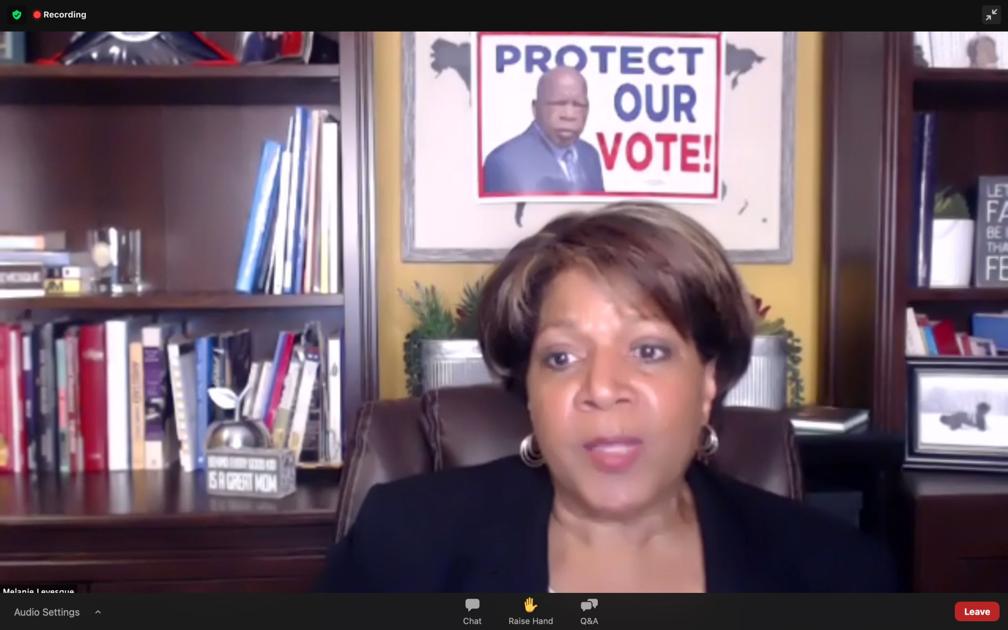Panelists say voter fraud is rare in NH

When New Hampshire’s COVID-19 state of emergency expires, many of the ways voting in the state was altered during the pandemic will be reversed. But there are proposals — both in Concord and Washington — that are seeking to change that.
On Wednesday night, the Jonathan Daniels Center for Social Responsibility hosted a Q&A discussion about the pandemic and voting legislation with former state Sen. Melanie Levesque, a Democrat, and attorney Bradford Cook, a Republican. In a conversation mediated by former Sentinel editor and President James Rousmaniere, both weighed in on what the future of voting in New Hampshire should look like.
The discussion was also sponsored by The League of Women Voters NH and Open Democracy.
In the months following the 2020 presidential election, many — including supporters of former President Donald Trump, who made unfounded claims the election was stolen from him — have raised concerns about election fraud. This has been reflected both nationally and in states that have introduced legislation aimed at preserving election security. Opponents of these proposals argue they unreasonably restrict voter access.
Levesque and Cook expressed support for the measures taken during the public health crisis to make voting in New Hampshire easier by expanding absentee voting, permitting the use of ballot drop-boxes (as long as they were supervised) and allowing more creative options like drive-up voting.
“It was very controlled, and it worked very well,” said Cook, who chaired the state’s Select Committee on 2020 Emergency Election Support. “And there was a record turnout.”
But efforts to put some of those measures permanently on the books have seen mixed results. Levesque noted that N.H. Senate Bill 47 — which would have allowed for no-excuse absentee voting and early partial processing of absentee ballots — was killed.
However, SB 2, which focuses just on early partial processing of absentee ballots — in which the ballot’s outer envelope is opened ahead of the election, but not the inner envelope containing a person’s vote — has been retained in committee.
“It’s just one step that makes the whole process easier,” Levesque said.
Other bills, she feels, would do the opposite. She said there have been a number of bills proposed that would make voting more difficult for some groups, such as college students; make it more difficult to vote absentee; and remove New Hampshire’s same-day registration option.
New Hampshire currently does a solid job of balancing election security with election access, Cook said. It’s important not to lean too far to one side, which could risk either election interference on the one hand or voter suppression on the other, he said.
“The people that worry me the most are the ones that think there was fraud in that election and that somehow the election was stolen last year,” Cook said of the 2020 presidential race. “And they put in all these bills to make it harder to vote, thinking somehow they’re going to keep the people who ‘stole the election’ from stealing another one.”
Asked about election integrity in New Hampshire, the panelists said they had faith in the state’s system and that instances of voter fraud are rare.
Cook did, however, say he doesn’t agree with letting college students vote in the towns where they attend school, noting that he had to vote absentee in college. He and Levesque also disagree about the For the People Act, a federal bill that proposes a number of adjustments to voting standards across the U.S.
Levesque said the bill, which is awaiting a vote in the U.S. Senate, would do a lot of things — such as enabling same-day voter registration and automatic registration nationally — that many places are already doing successfully.
Cook said the 600-page bill is too long. And while some facets of the bill are good, he said, much of what it proposes would be unnecessary — such as automatic registration and portable registration (meaning people can vote in polling places away from home) — and already covered by the state’s same-day registration option. He is also adamantly opposed to measures that would take the voting process online, which he fears would make elections more susceptible to hacks.
On Wednesday, the N.H House Election Law Committee voted 11-8 along party lines to amend SB 89, an election omnibus bill, to include the assertion that if the For the People Act passes, New Hampshire would still make the rules for its state and local elections.
However, toward the end of Wednesday’s conversation, both Cook and Levesque agreed that one result of the emergency voting rules instituted last year was a dramatically higher voter turnout.
“Certainly the change in the rules accounted for the incredibly larger number of absentees,” Cook said. “But remember, last year, all across the country, Joe Biden got more votes than any person that ever ran for president. The second most votes of anybody that ever ran for president was President Trump’s vote last year.”


